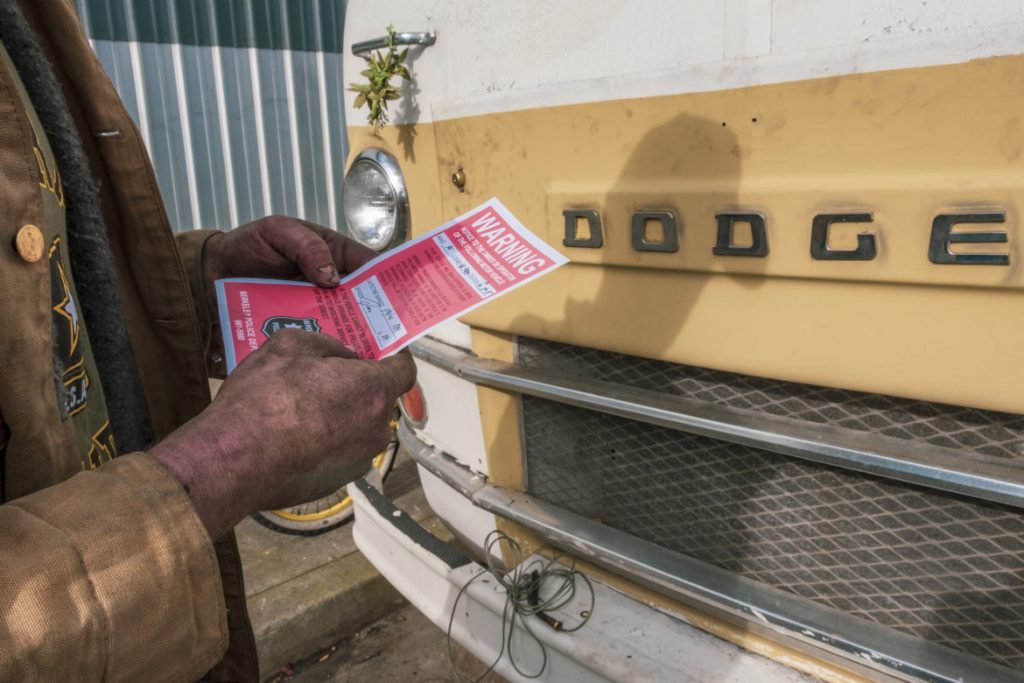
After two-plus years in the same location, Berkeley Friends on Wheels—a community of houseless people who live in vehicles—are being forced to move along. In early October, City of Berkeley employees chalked the tires of all of the vehicles parked on the corner of Eighth and Harrison Streets in West Berkeley, which means that they had 72 hours to move their vehicles before potentially being towed. Many of the vehicles were also “red-tagged,” meaning they were tagged with an official notice giving them 72 hours to move. The city also rezoned the area for four-hour parking, surprising residents who have lived there for years. City employees cite the enforcement of these new parking rules and the “freeing up of on-street parking” as the reason for the community’s closure, as well as reducing trash and “illegal water discharge” on public streets and into storm drains.
For residents, eviction means a complete upheaval of their homes and support systems, including contacts with services and outreach providers who can more easily find them while they are living consistently in one place.
“It’s been difficult because I feel like we’ve been pushed around from one place to another until we ended up here,” said Yesica Prado, a Berkeley Friends on Wheels organizer and member. “We have faced these challenges before… so we’re kind of used to it, but it’s hard. People have mental distress about it all the time. That’s why when we actually got a chance to stay here, it was some really big relief.”
Berkeley Friends on Wheels is one of the largest communities of vehicle dwellers in the city of Berkeley. Their community, like other vehicle dwellers in the bay area, has faced constant displacement and trauma at the hands of the city since they first organized as a community while living at the Berkeley Marina in 2018. After the group at the marina grew to more than 70 vehicles, the City of Berkeley started posting construction notices and handing out red ticket notices. After that, Friends on Wheels moved to a nearby parking lot at the marina—but the city kicked them out of the lot as well, saying they wanted to repaint the lines in the parking lot. The group then moved around on the street before settling at the intersection of 8th and Harrison, where many have been since.
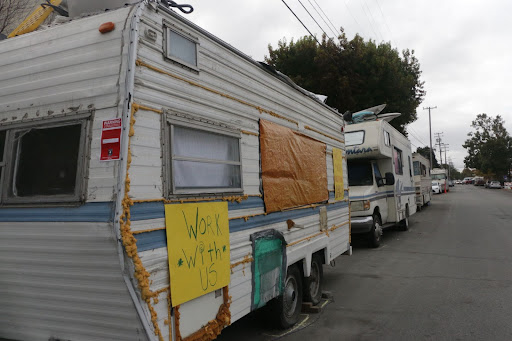
Starting on September 24, the City of Berkeley began posting street cleaning signs up and down Eighth Street and Harrison Street. The signs indicated that residents had until October 6 to move their vehicles to make way for street sweeping machines or risk being towed.
As the sun rose on October 6, residents of Berkeley Friends on Wheels gathered to peacefully resist displacement. The community of 14 RVs, two vans, and two cars are parked parallel to a Tesla Service Center—separated from their garage by only the sidewalk. They were joined in protest by a group of about twenty supporters, including UC Berkeley students, legal observers, and other community advocates. At 8:00 a.m., a small team of city employees arrived. City workers began to execute what Assistant to the City Manager Peter Radu called a “deep clean” of the Harrison area, using rakes and shovels to load residents’ belongings into a garbage truck. In one instance, they trashed a pile of belongings outside of one resident’s vehicle that he intended to keep, including cookware, a cooler full of food, cooking supplies, clothing, shoes, and other personal items.
Community members told Radu and other city employees that they were concerned about the Friends’ impending displacement and the city’s inability to provide an adequate alternative shelter. Radu dismissed residents’ claims that the City of Berkeley was displacing people in enforcing the new parking restrictions, calling the action a “deep clean” that would not displace any of the residents from their vehicles.
“After a long pause during the height of the pandemic, the City is beginning to resume normal operations, and this includes citywide enforcement of our parking rules,” Peter Radu told Street Spirit in an email. “We are not enforcing any laws that prohibit sleeping or living in one’s vehicle; we are simply asking that anyone who is using their vehicle as shelter comply with the same parking rules that every vehicle owner in Berkeley must comply with.” However, many of these laws effectively make it impossible to live in your vehicle in Berkeley. For example, a law passed in March of 2019 says that RVs are banned from parking anywhere in the city between the hours of 2:00 and 5:00 a.m.
Clarence Galtney has been with Berkeley Friends on Wheels for two and a half years at Eighth and Harrison Streets. He has COPD, and says that the stress of this potential displacement has had a profound impact on his health. Galtney was hospitalized in the days after the street cleaning signs were posted, and said that he felt like he hadn’t had enough time to mentally and physically prepare to uproot his home.
“I would prefer to be here just for the simple fact that [what they’re offering is] just for one year and after the year is up, you’re going to be shuffling from corner to corner every 72 hours,” Galtney said. “I’ve been here for two and a half years and I’m comfortable here. I feel I’m safe here, right here in this spot.”
Residents have been told they can move their vehicles to a “free, off-street parking program in West Berkeley for people living in RVs,” according to a flyer handed out by City of Berkeley Neighborhood Services staff. The lot is attached to the Horizon Transitional Village on Grayson Street—about two miles away from Berkeley Friends on Wheels.
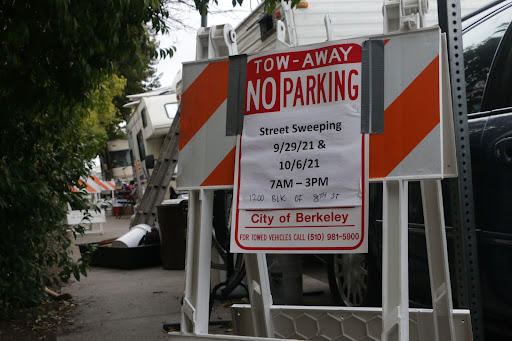
The City of Berkeley is also offering vehicle dwellers a spot at SPARK, the Safe Parking and Respite Kickstart site on Grayson Street next to the Dorothy Day House. According to city staff, the SPARK site is able to accommodate up to 40 vehicles, and spots are filled on a first-come first-served basis. But the move wouldn’t be permanent—the lease at the site ends September 30, 2022.
So far, only four vehicles from the community have successfully made it into the Grayson lot, according to Prado. She and other members of the Friends on Wheels community say that they only had one week’s notice that they could move into the lot before the tows were scheduled to begin. This short time frame made it extremely difficult for people to realistically prepare to move all of their belongings and get their vehicles up to the standards required to park in the lot.
Furthermore, moving to the lot is not an option for all folks who live in their vehicles. Residents point to the many restrictions placed on vehicle dwellers by the safe parking site as a reason why they do not want to—or cannot—move to the new site.
“What’s really frustrating about this is that they didn’t start doing their outreach soon enough. They like to pretend that they did outreach extensively,” Prado said. “[But] all my neighbors come and ask me because they don’t know, they get mixed messaging, I get mixed messaging. So it’s just confusion right now.”
One of the most exclusionary restrictions imposed by this site is that vehicles have to be operational in order to park on the lot—a subject residents have received conflicting information about.
Amber Whitson, who has been living with Berkeley Friends on Wheels since the group was parked at the Marina, said that initially residents were told that non-operational vehicles could move into the lot as long as people towed their vehicle to the site themselves. But according to Whitson, when a friend got her vehicle towed to the Grayson lot, she was turned away because her vehicle did not meet the requirements to park in the lot.
According to an emailed statement from Radu on October 22, that policy will change in the weeks ahead. Radu said that if people living in non-operational vehicles are still interested in the SPARK program, the city will begin working to find ways to offer to tow them onto the lot. Initially, the city said that they had funding to assist folks in paying for vehicle repairs—but that will change too, according to Radu.
“Moving forward, vehicles will no longer need to be operable to participate in the program, but we do not have the funding to guarantee vehicle repairs,” he said. “There is limited space at SPARK and we have a list of eligible vehicles based on our previous work with people in this area.”
Residents say the back and forth regarding the permission of non-operational vehicles to park in the lot is common, and reflects a greater trend of mixed messaging residents received from city staff about the eviction and SPARK site restrictions.
The site also has restrictions on how many pets people are allowed to have in their vehicles. Whitson says the rules on pets are also prohibiting her from moving to the lot as she has four small dogs.
For folks with families and children, moving to the Grayson lot is not even an option. According to a City of Berkeley staff report on the Dorothy Day House contract, families with minor children will not be accommodated at the SPARK site because the program lacks the “enhanced staffing, training, and budgeting” to do so. Instead, Radu said the city will refer those families to family shelter beds through the Family Front Door.
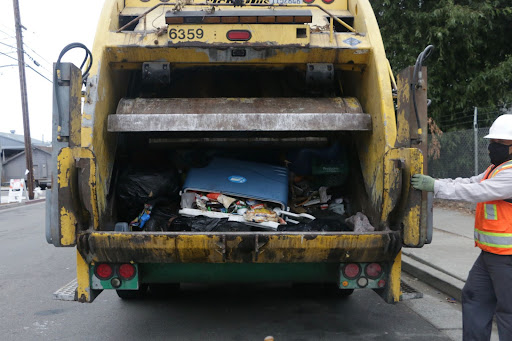
One of the biggest reasons why Clarence Galtney doesn’t want to move is because he wants his grandchildren to be able to come visit him. Children can come visit the SPARK site according to Radu, but they can’t spend the night.
The City of Berkeley only has a lease on the Grayson lot for one year, so some vehicle dwellers like Galtney are also hesitant to move to the lot because they are worried about long term stability.
Galtney also said that the barbed wire fencing encompassing the Grayson lot “didn’t sit right” with him and reminded him of a prison. He also said that the site’s restrictions on belongings and property stored outside of vehicles would mean that he couldn’t continue to collect bottles and cans for recycling—his only source of income.
If folks cannot for some reason move to the SPARK site, the city is supposed to offer them a shelter bed.
However, Berkeley Friends on Wheels members who cannot park in the lot say they haven’t been given that option even though they have asked.
For these reasons, the Friends on Wheels community intends to stay put until there are more safe and permanent spaces for all of their members to park their vehicles.
October 6 was supposed to be the last day for members of Friends on Wheels to move their vehicles from their current location before the city was set to begin enforcing the new parking restrictions. However, that day, the group filed paperwork for a temporary restraining order, a preliminary injunction, and a civil rights lawsuit against the City of Berkeley in resistance to the eviction.
Though they were not initially granted the TRO due to errors with their paperwork, community members say that they have not seen the city come back since they tried to file for the TRO—even though the city was supposed to start towing vehicles and enforcing the new parking rules starting on October 7. However, those who moved their RVs to neighboring streets during the “deep clean” have started receiving red tags in their new locations as well, according to Prado.
Radu said in an email on October 22 that the city will soon resume enforcement of the parking laws, including the new signage posted in the Harrison Street area. Any vehicle that does not comply with the parking restrictions will be at risk of being towed, he says.
In the meantime, Friends on Wheels members and organizers are preparing new documents to send to court. Their scope is broader this time: the TRO would protect all vehicle dwellers in Berkeley, not just those in their community.
“They still have an opportunity to stop what they’re doing and to do right by these people,” Anita de Asis Miralle, also known as Needa Bee, from The Village in Oakland said. “They have an opportunity to call off these tows and call off the seizing of people’s personal properties and throwing them in the dumpsters and actually sit with this community, which is what this community has been asking for three years—to sit with this community and figure out a solution.”
In their own words: What does your community mean to you?
We spoke to residents of Berkeley Friends on Wheels about what they love about their community, and what they would lose if forced apart. Find their hand-written statements below. We have added a typed out and lightly edited version of each statement below the original image for clarity.
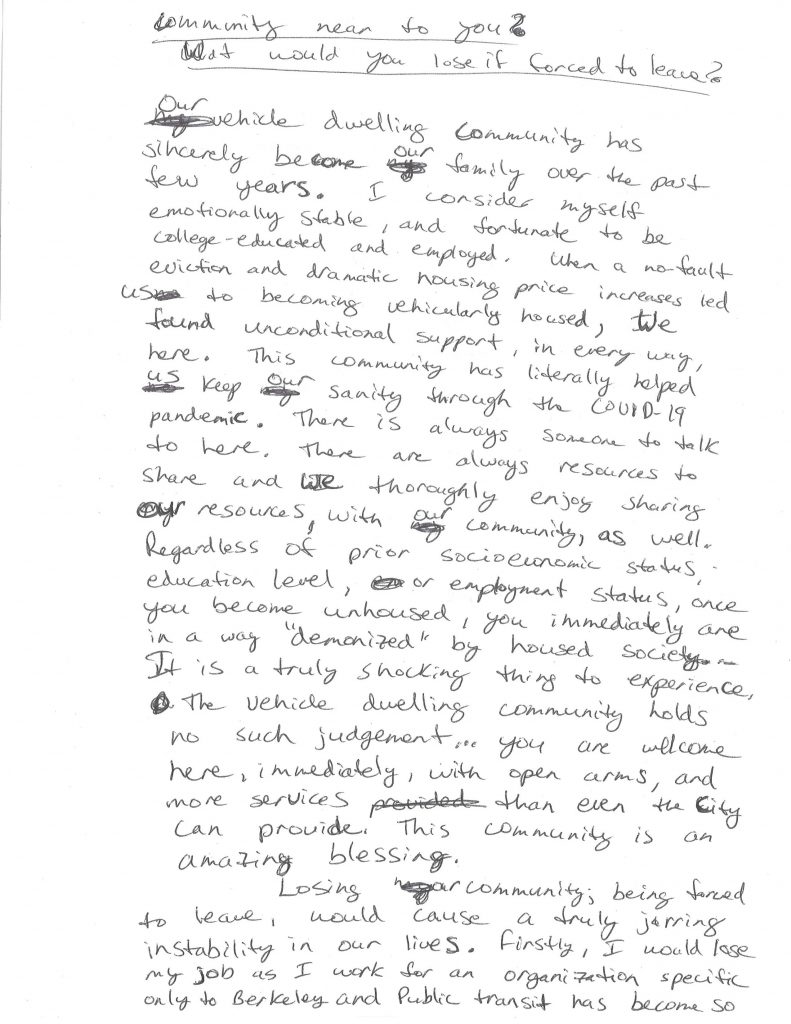
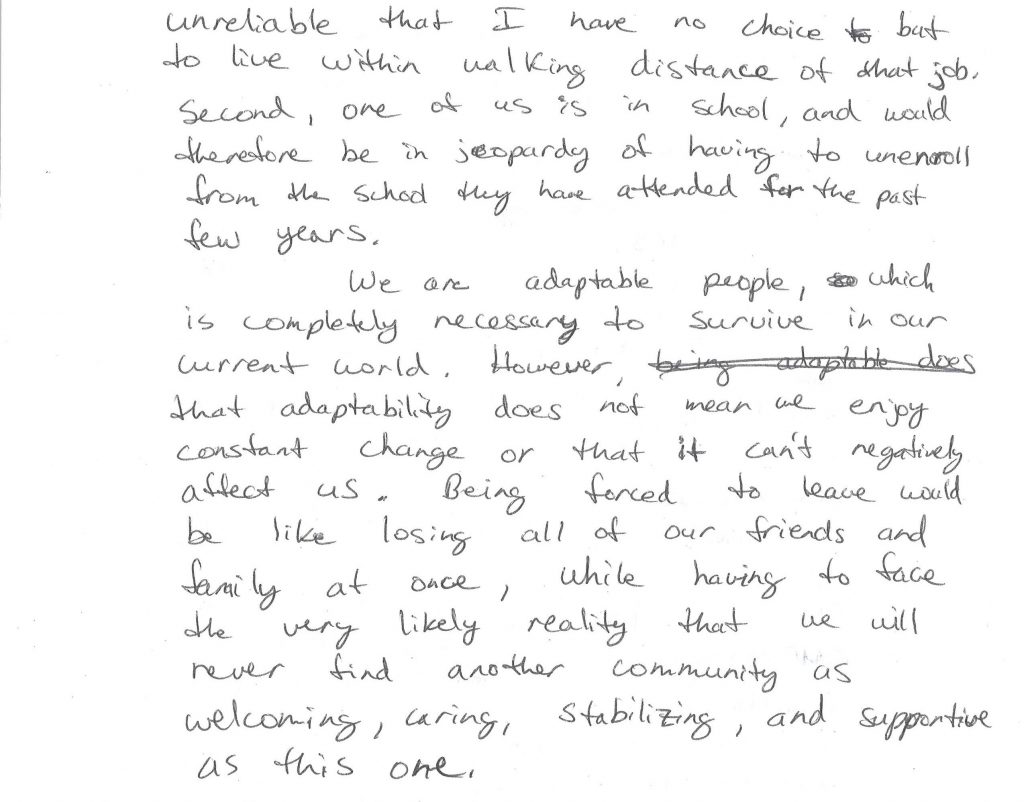
Our vehicle dwelling community has sincerely become our family over the past few years. I consider myself emotionally stable, and fortunate to be college-educated and employed. When a no-fault eviction and dramatic housing price increases led us to becoming vehicularly-housed, we found unconditional support, in every way, here. This community has literally helped us keep our sanity through the COVID-19 pandemic. There is always someone to talk to here. There are always resources to share and we thoroughly enjoy sharing our resources, with our community, as well. Regardless of prior socioeconomic status, once you become unhoused, you immediately are in a way “demonized” by housed society. It is a truly shocking thing to experience. The vehicle dwelling community holds no judgment.. you are welcome here, immediately, with open arms, and more services than even the city can provide. This community is am amazing blessing.
Losing our community; being forced to leave, would cause a truly jarring instability in our lives. Firstly, I would lose my job as I work for an organization specific only to Berkeley and public transit has become so unreliable that I have no choice but to live within walking distance of that job. Second, one of us is in school, and would therefore be in jeopardy of having to unenroll from the school they have attended for the past few years. We are adaptable people, which is completely necessary to survive in our current world. However, that adaptability does not mean we enjoy constant change or that it can’t negatively affect us. Bring orchid to leave would be like losing all of our friends and family at once, while having to face the very likely reality that we will never find another community as welcoming, caring, stabilizing, and supportive as this one.
—Anonymous
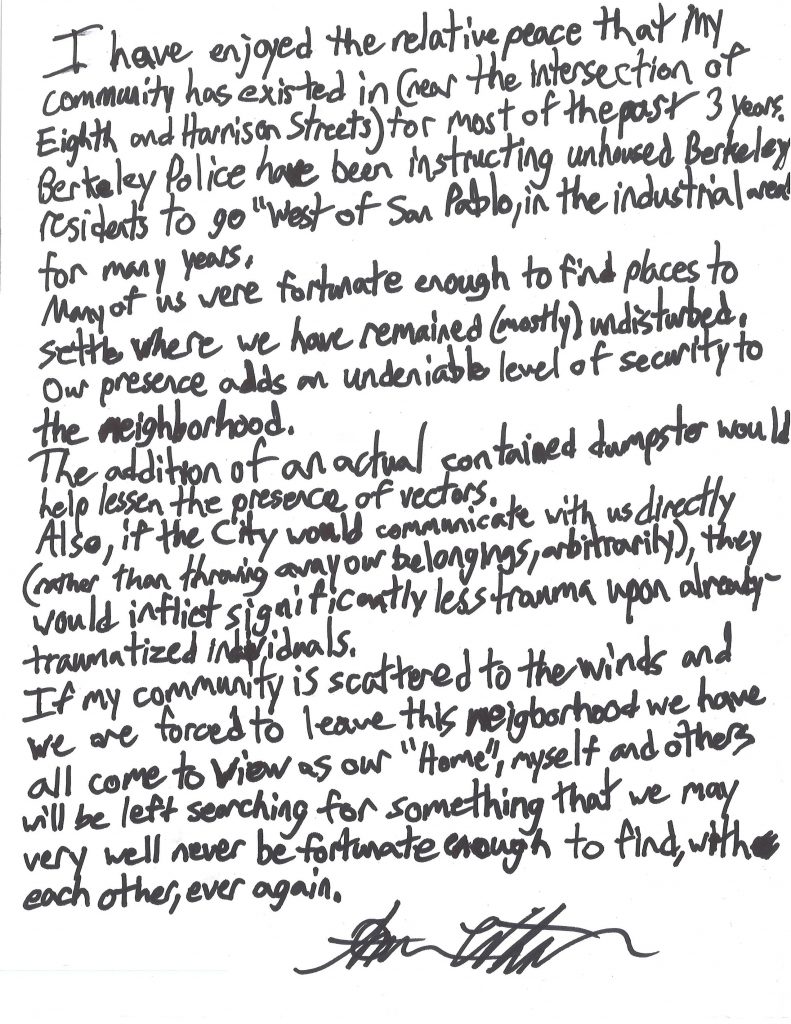
I have enjoyed the relative peace that my community has existed in (near the intersection of Eighth and Harrison Streets) for most of the past three years. Berkeley Police have been have been instructing unhoused Berkeley residents to go “west of San Pablo, in the industrial area” for many years. Many of us were fortunate enough to find places to settle where we have remained (mostly) undisturbed. Our presence adds an undeniable level of security to the neighborhood. The addition of an actual contained dumpster would help lessen the presence of vectors. Also, if the city would communicate with us directly (rather than throwing away our belongings, arbitrarily), they would inflict significantly less trauma on already-traumatized individuals. If my community is scattered to the winds and forced to leave this neighborhood we have all come to view as our “home,” myself and others will be left searching for something that we may very well never be fortunate enough to find, with each other, ever again.
—Amber Whitson
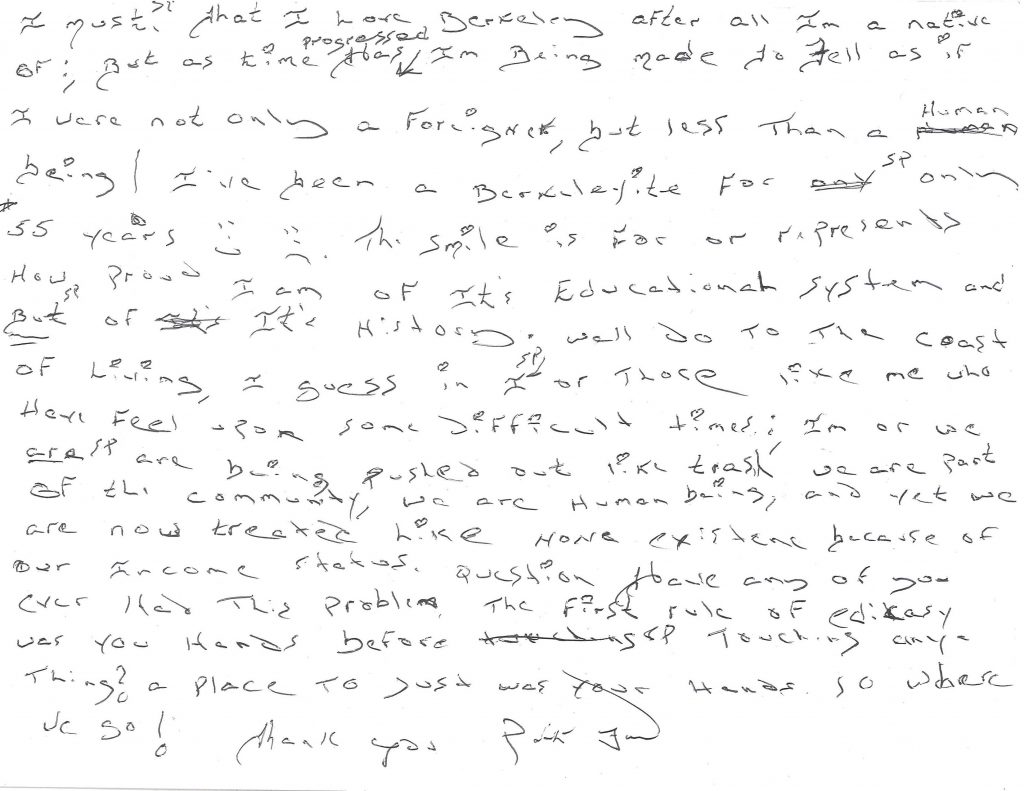
I must say that I love Berkeley, after all I am a native. But as time has progressed I’m being made to feel as if I were not only a foreigner, but less than a human being! I’ve been a Berkeleyite for only 55 years. 🙂 🙁 The smile is for, or represents, how proud I am of its educational system and of its history. Well due to the cost of living, I guess I or those like me who have fallen upon some difficult times, I am or we are being pushed out like trash. We We are part of the community, we are human beings, and yet we are now treated like we are non-existent because of our income status. Question: Have any of you ever had the problem where the first rule of etiquette is wash your hands before touching anything? A place to just wash your hands. So where do we go?
Thank you,
Patrick J
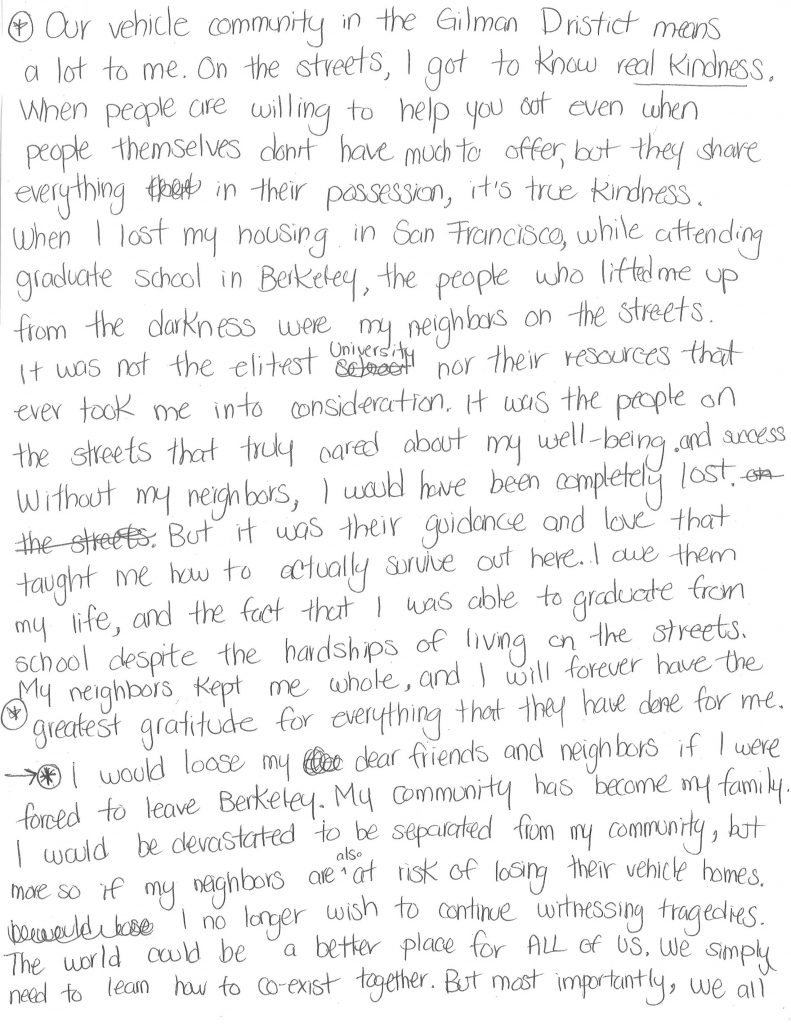

Our vehicle community in the Gilman District means a lot to me. On the streets, I got to know real kindness. When people are willing to help you out even when people themselves don’t have much to offer but they share everything in their possession, it’s true kindness. When I lost my housing in San Francisco, while attending graduate school in Berkeley, the people who lifted me up from the darkness were my neighbors on the streets. It was not the elitist university nor their resources that ever took me into consideration. It was the people on the streets that truly cared about my well-being and success. Without my neighbors, I would have been completely lost. But it was their guidance and love that taught me how to actually survive out here. I owe them my life, and the fact that I was able to graduate from school despite the hardships of living on the streets. My neighbors kept me whole, and I will forever have the greatest gratitude for everything they have done for me.
I would lose my dear friends and neighbors if I were forced to leave Berkeley. My community has become my family. I would be devastated to be separated from my community, but more so if my neighbors are also at risk of losing their vehicle homes. I no longer wish to continue witnessing tragedies. The world could be a better place for all of us. We simply need to learn how to co-exist together. We all need a vessel to weather out this storm—the storm that we call life.
—Yesica Prado, October 28 2021
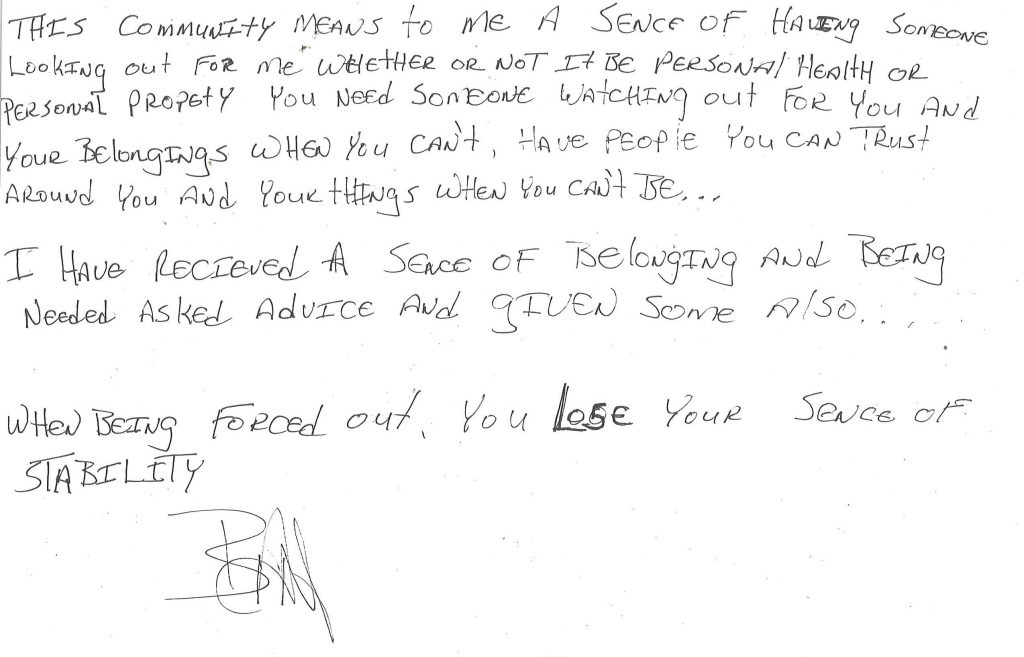
This community means to me a sense of having someone looking out for me. Whether or not it be personal health or personal property you need someone watching out for you and your belongings. When you can’t, have people you can trust around you and your things when you can’t be. I have received a sense of belonging and being needed. I have asked advice and given some also. When being forced out, you lose your sense of stability.
—Bruce
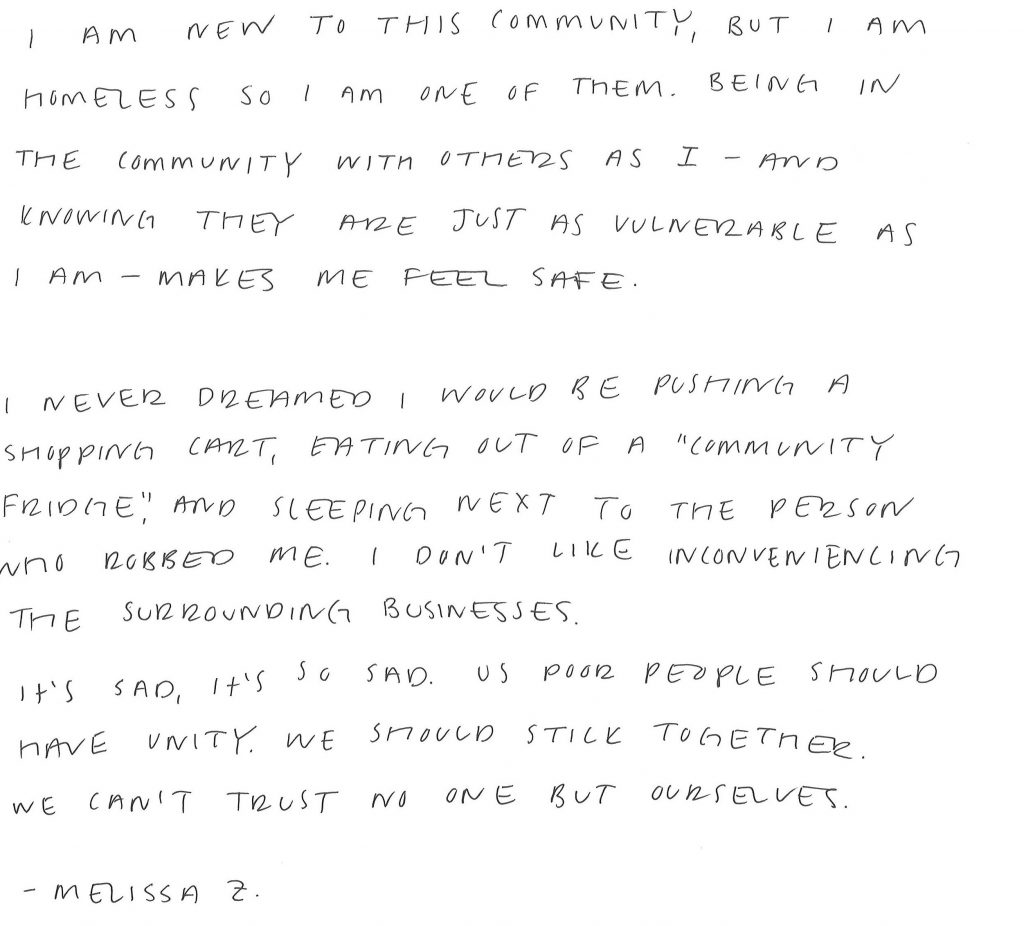
I am new to this community, but I am homeless so I am one of them. Being in the community with others as I—and knowing they are just as vulnerable as I am—makes me feel safe. I never dreamed I would be pushing a shopping cart, eating out of a “community fridge,” and sleeping next to the person who robbed me. I don’t like inconveniencing the surrounding businesses. It’s sad, it’s so sad. Us poor people should have unity. We should stick together. We can’t trust no one but ourselves.
—Melissa Z
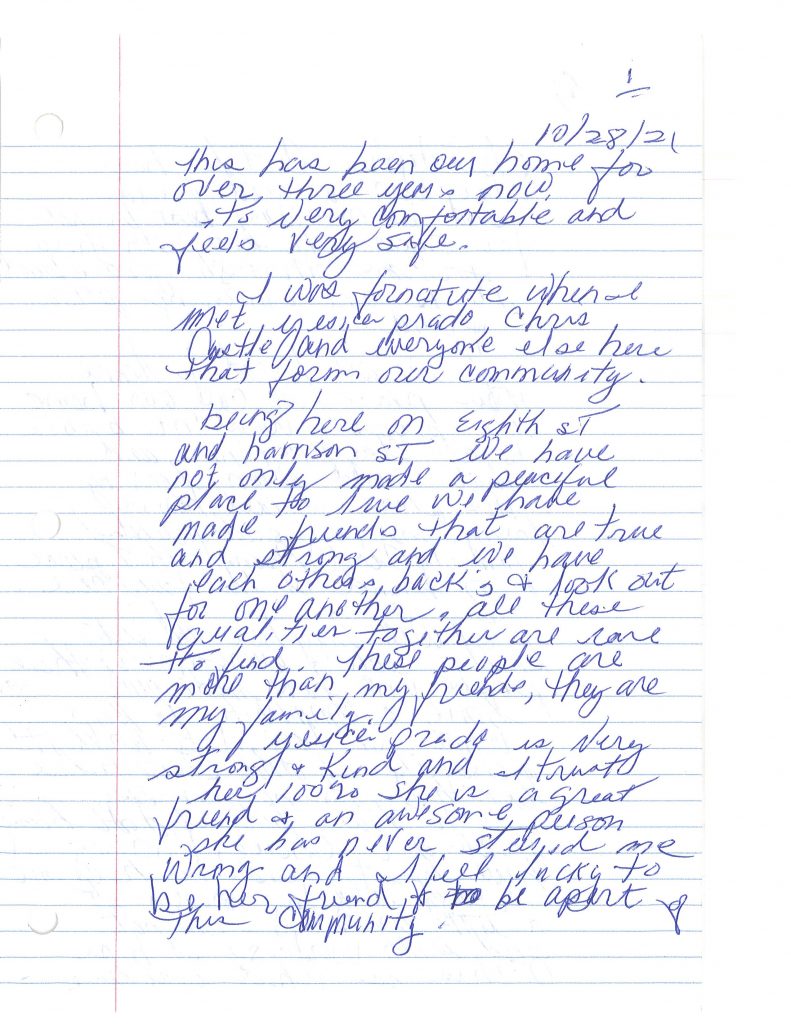
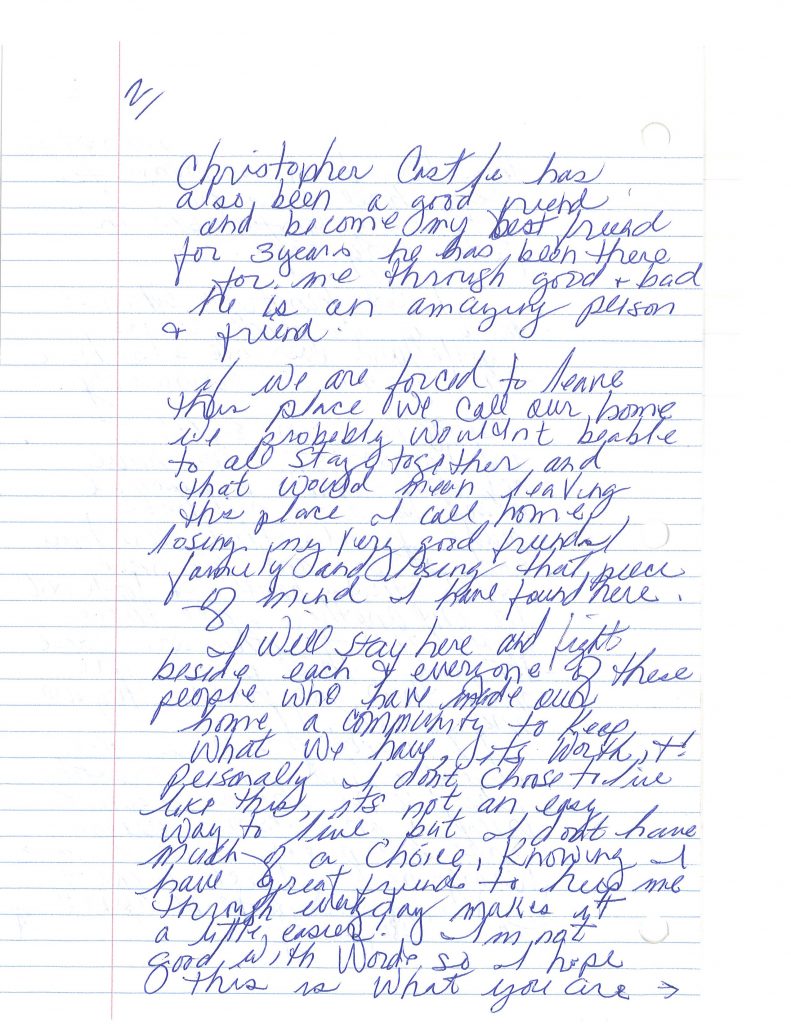
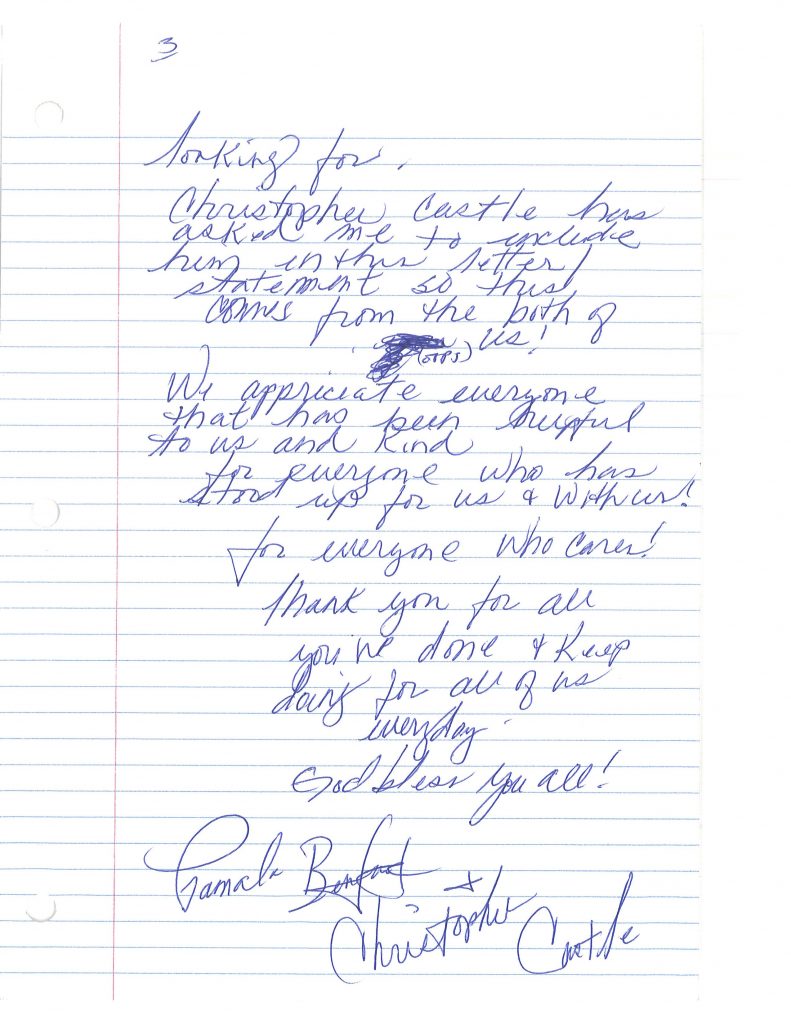
This has been my home for over three years. Now, it’s very comfortable and feels very safe. I was fortunate when I met Yesica Prado, Chris Castle, and everyone else here that forms our community. Being here on eighth Street and Harrison Street, we have not only made a peaceful place to live, we have made friends that are true and strong and we have each other’s backs and look out for one another. All these qualities together are rare to find. These people are more than my friends, they are my family. Yesica Prado is very strong and kind and I trust her 100%. She is a great friend and an awesome person. She has never steered me wrong and I feel lucky to be her friend and to be a part of this community. Christopher Castle has also been a good friend and become my best friend for three years. He has been there for me through good and bad. He is an amazing person and friend.
If we are forced to leave the place we call our home, we probably won’t be able to all stay together and that would mean leaving the place I call home, losing my very good friends/family, and losing that peace of mind that I have found here. I will stay here and fight beside each and every one of these people who have made our home a community to keep what we have. It’s worth it! Personally I don’t choose to live like this, it’s not an easy way to live, but I don’t have much of a choice. Knowing I have great friends to help me through every day makes it a little easier. I’m not good with words, so I hope this is what you are looking for.
Christopher Castle has asked me to include him in this letter/statement so this comes from the both of us! We appreciate everyone that has been helpful to us and kind, for everyone who has stood up for us and with us! For everyone who cares! Thank you for all you have done and keep doing for all of us everyday. God bless you all!
—Pamela B and Christopher C
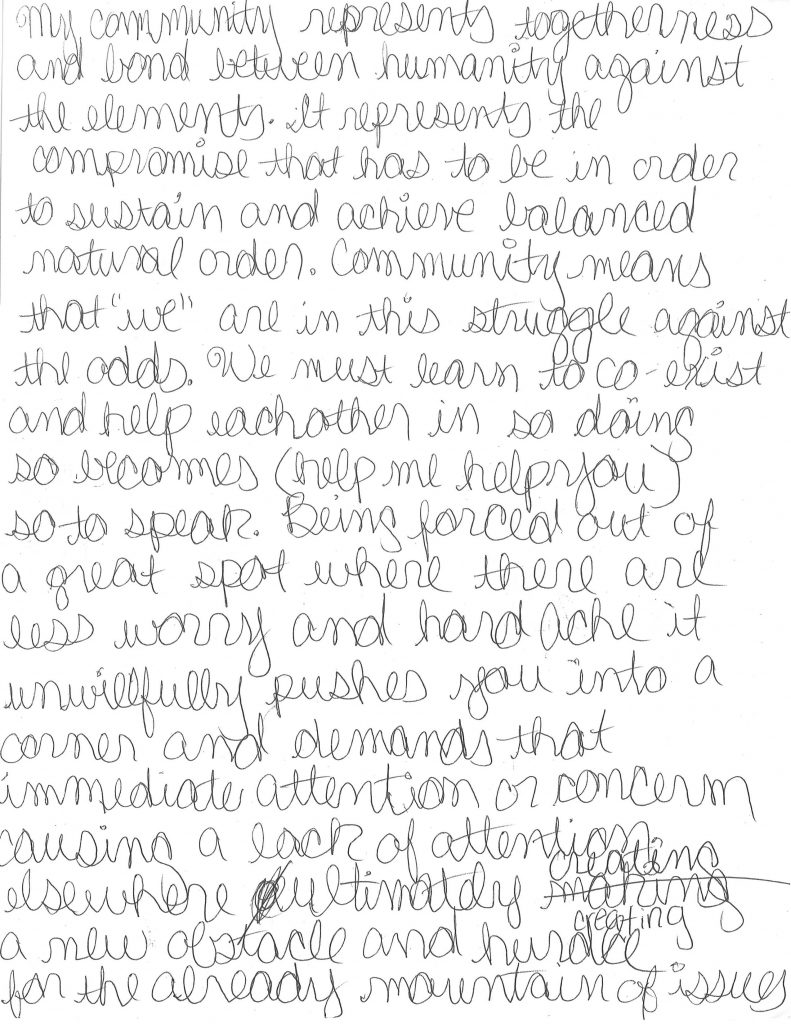
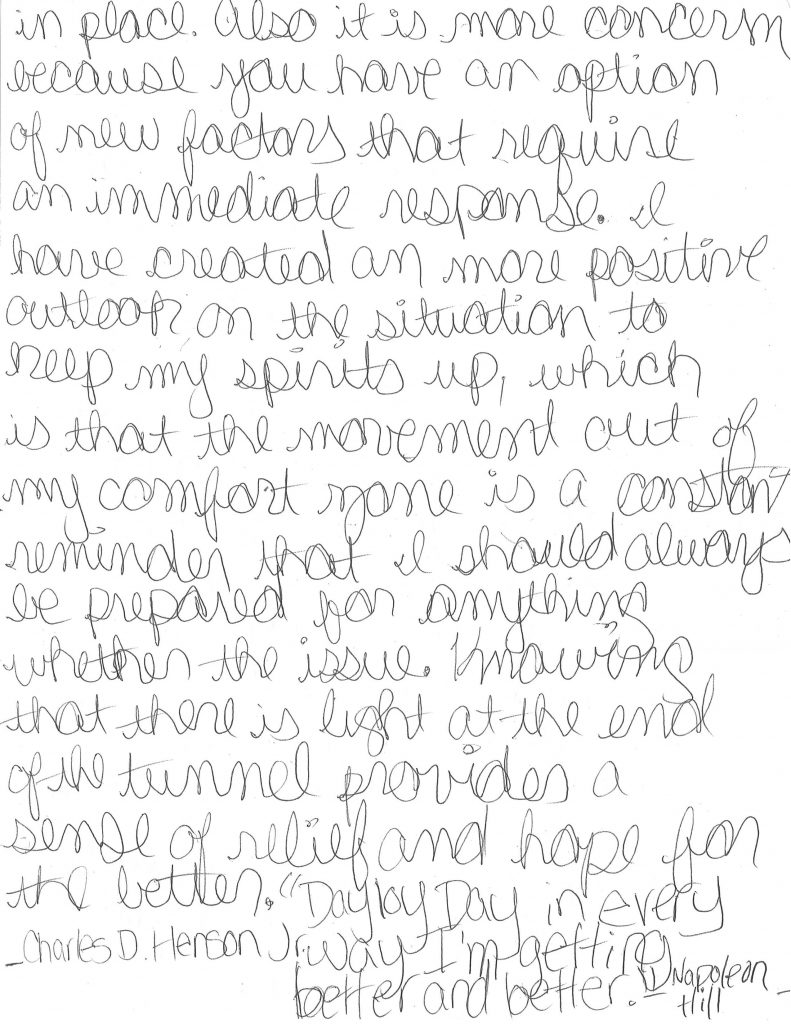
My community represents togetherness and bond between humanity against the elements. It represents the compromise that has to be in order to sustain and achieve balanced natural order. Community means that “we” are in this struggle against the odds We must learn to co-exist and help each other. In so doing, so becomes (help me help you) so to speak. Being forced out of a great spot where there are less worries and headaches, it unwillfully pushes you into a corner and demands that immediate attention or concern, causing a lack of attention elsewhere. Ultimately, creating a new obstacle and hindrance for the already mountain of issues in place. Also, it is more concerning because you have an option of new factors that require an immediate response. I have created a more positive outlook on the situation to keep my spirits up, which is that the movement out of my comfort zone is a constant reminder that I should always be prepared for anything, whatever the issue. Knowing that there is light at the end of the tunnel provides a sense of relief and hope for the better.
“Day by day in every way I’m getting better and better.” (Napoleon Hill)
—Charles D. Henson Jr.
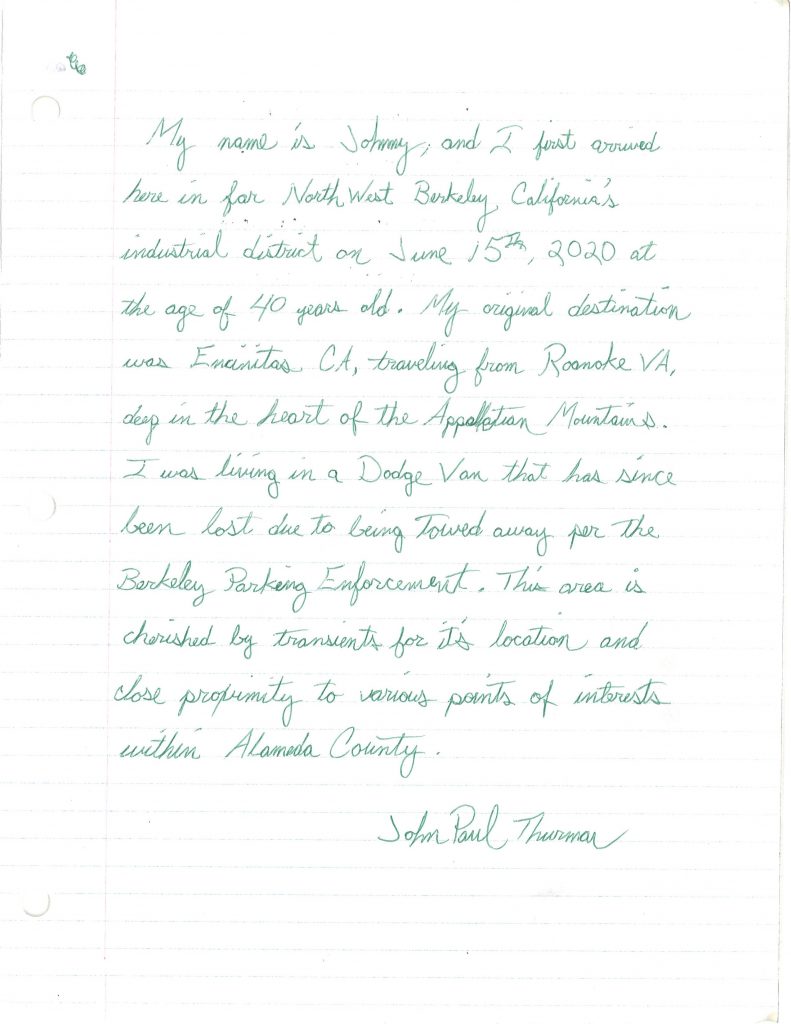
My name is Johnny, and I first arrived here in North West Berkeley, California’s industrial district on June 15h, 2020 at the age of 40 years old. My original destination was Encinitas, CA, traveling from Roanoke, VA, deep in the heart of the Appalachian Mountains. I was living in a Dodge Van that has since been lost due to being towed away per the Berkeley Parking Enforcement. This area is cherished by transients for its location and close proximity to various points of interesest within Alameda County.
—John Paul Thurman
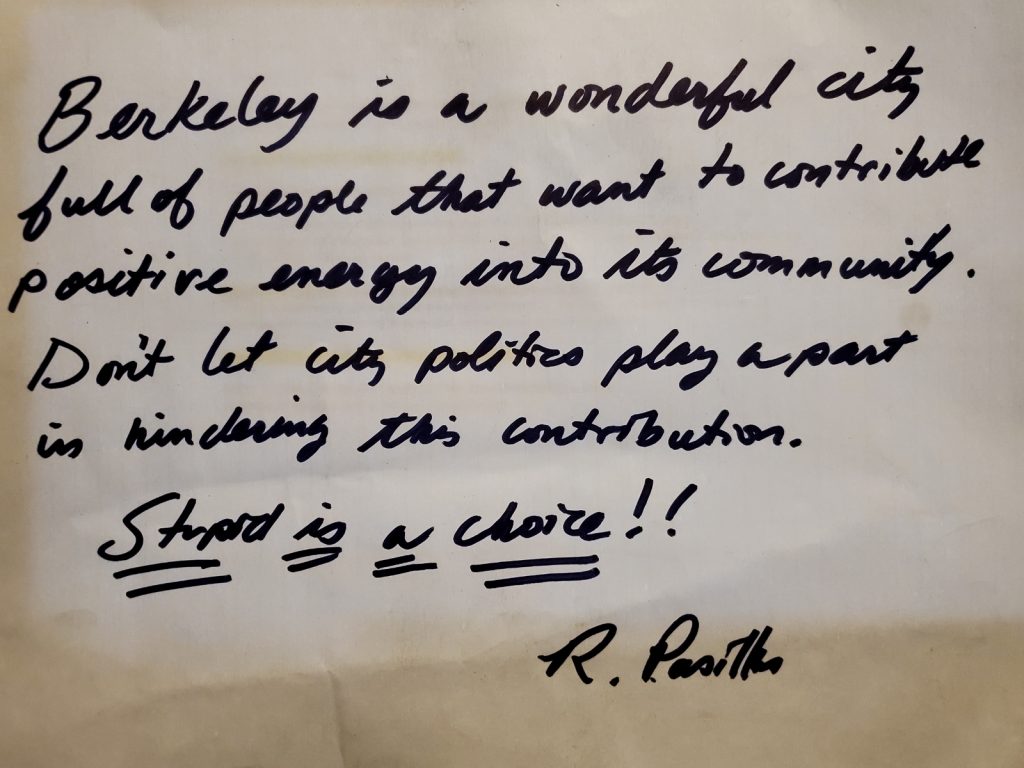
Berkeley is a wonderful city full of people that want to contribute positive energy into its community. Don’t let city politics play a part in hindering this contribution. Stupid is a choice!!
—R. Pasilla
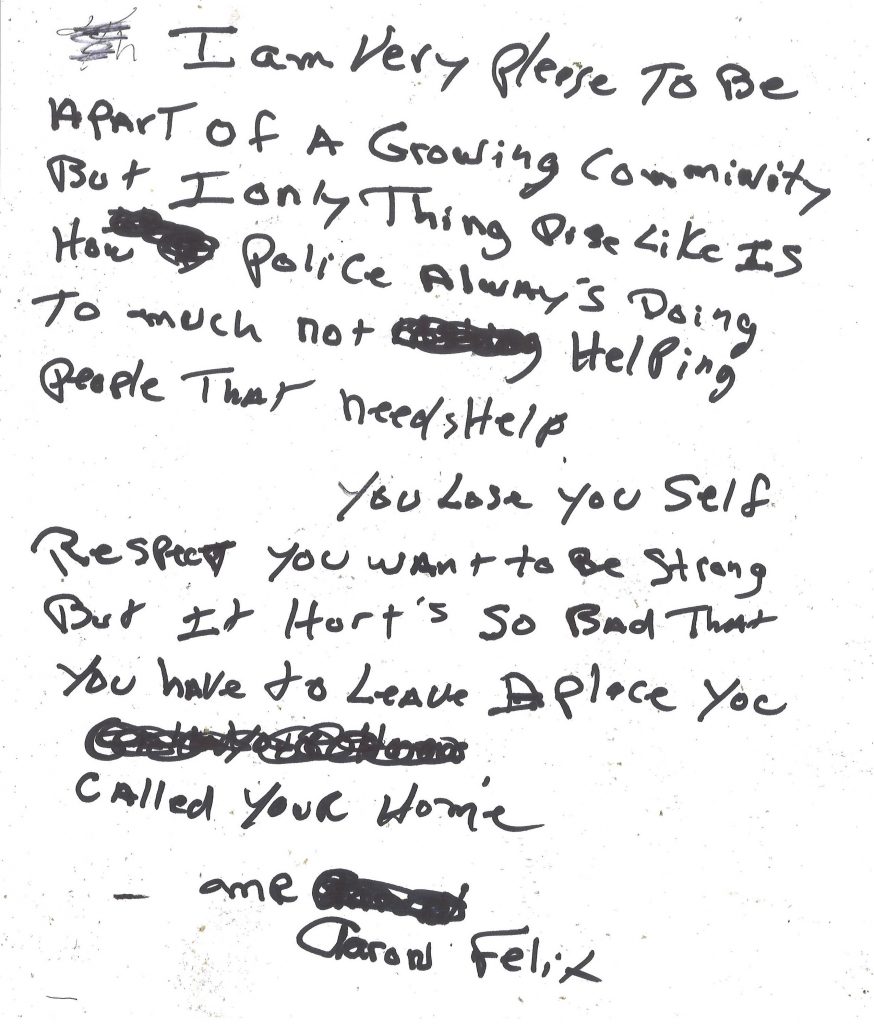
I am very pleased to be a part of a growing community but one thing I dislike is how police are always doing too much, not helping people that needs help. You lose your self-respect, you want to be strong but it hurts so bad that you have to leave a place you called your home.
—Aaron Felix
Alastair Boone contributed reporting.
Isabella Fertel is a graduate student studying at UC Berkeley’s School of Journalism.
